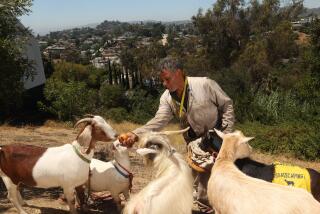Ruffled Feathers : Collection of Birds and Beasts Runs Afoul of the Neighbors
- Share via
Several Redondo Beach residents are squawking about a neighboring family’s collection of chickens, doves and cats, and they want city officials to decide the pecking order on South Irena Avenue.
Roseanne Smith said she and her two sisters, Kathy and Joan, are trying to be good neighbors and already have reduced their collection to 31 hens, 4 roosters, 3 cats and 7 doves.
By some accounts, the women have had up to 50 hens, 19 roosters, 20 cats and 14 doves at one time during the past year.
Kick Up Dust
The residents--who said the Smiths are otherwise good neighbors--complained that the chickens kick up dust in the barren yard that the wind carries into their homes, that they attract insects, skunks and other animals and that, together with the cats, they soil the property.
Then there are the odors and all the clucking, crowing and cooing.
“We’re basically afraid that the situation is going to deteriorate to the point where it cannot be fixed,” said a next-door neighbor of the Smiths.
The city and the Los Angeles County Health Services Department are investigating. Elaine Demos, a county environmental health office, said that chickens must be kept at least 35 feet from residential dwellings and 100 feet from schools.
66 Feet From Property
The main building of Tulita Elementary School, however, is only 66 feet from the Smith’s property and a newly erected classroom is 24 feet from the property, said Beverly Rohrer, deputy superintendent for the Redondo Beach City Elementary School District.
Demos said that the Smiths were given several health citations last fall for not keeping the yard clean and for letting the chickens wander closer than 35 feet from the neighbors’ houses.
The county health department told the Smiths last December how the yard and coops must be maintained to comply with the county health code. Demos said she did not find any chickens in the Smith’s yard last week during an unannounced inspection. She said she did not check inside the house, where Smith said she sometimes takes the chickens.
Another next-door neighbor said the Smiths’ cats scratched the paint on his two Mercedes. He said that so far he could afford to have only one car repainted, which cost him $1,500.
Smith said that her cats stay in her yard most of the time, although they do wander off occasionally.
Fence Planned
The neighbor said he plans to build a wooden fence in front of the Smiths’ chain-link enclosure to keep the dust from blowing into his yard. He expects that to cost about $800.
But he said he doesn’t dislike the Smiths, or animals. “If people like animals,” he said, “they have good character, that’s what I think.”
The other next-door neighbor said her son has allergies that a doctor said were probably caused by dust and feathers. She said her children, ages 3 and 5, have picked up dead kittens in their yard that she believes were left by the Smiths’ cats.
“I don’t see how you can stop your children from playing,” she said. “What am I going to do? Put my kids on a chain (while) her chickens run loose?”
She said she has complained to city and county health officials.
The neighbor said that she paid $68 to have the Smiths’ cats neutered and found homes for five of them, “because I was trying to be a good neighbor.”
Roseanne Smith said she and her sisters, who live with their father, Edmund, who is retired, have been trying to be good neighbors.
Tries to Control Dust
She said she cleans the chickens’ yard at least once a day and tries to keep it watered down so the dust won’t blow into neighboring yards. Smith, who is unemployed, said she will plant more shrubs when she can afford to do so to keep the dust from blowing.
She said she paid $160 to get four roosters “decrowed”--a surgical process in which a membrane at the base of the trachea is cauterized to minimize the air flow that creates the crowing sound.
The roosters were surprised when they realized they could no longer crow, Smith said, although a couple of them can still manage a few notes.
“He can hear himself, and he wishes it were louder,” she said, looking at one caged rooster, “but it’s something I had to do to keep them.”
She said she could not afford the surgery for all the roosters so she paid $150 to have 15 of them put to sleep.
“You can’t really find a good home for a rooster, not really,” she said, “so the best thing I could do for them was put them to sleep. . . . I think of them every day.”
Smith, 35, said she has been raising chickens since she was 8 years old when her parents gave her and her sisters chicks for Easter presents. She said her family doesn’t eat the chickens but they do eat the eggs.
“We’ve had them too long to think of them as anything but pets,” she said. “They know you; they come to you; they know your voice--that’s a pet.” They all have names, such as Anna Marie, Beth, Charles and Skippy.
She has several breeds of chickens, including bantams, White Sultans and Rhode Island Reds and she has cross-bred some of them.
As for the skunks and other rodents in the neighborhood, Smith said: “As long as we’ve lived here we’ve seen critters--before we had the pets. . . . It’s nothing unusual.”
Plastic Eggs
Smith said she tries to limit her flock and rarely lets the hens hatch eggs. They sit on plastic eggs instead, she said. “Sometimes they get broody because they’re not going to hatch” and refuse to leave their nests, she said. When that happens, she said she lets the hen hatch one egg.
The Smiths had a dog and some rabbits but they died about four years ago. The sisters also had had hamsters, turtles and goldfish when they were children. “We just like animals,” she said.
Roseanne Smith handles the chickens while Kathy, 33, cares for the cats and Joan, 31, looks after the doves. “We all have animals that we like and we don’t bother anybody,” Roseanne said.
“What if she liked dogs and she had 35 dogs?” asked Keith DeYoung, who lives across the street from the Smiths and voiced the same complaints as the other neighbors. “I wouldn’t be opposed to maybe a few chickens--like 10 at the most--if they were cooped properly. They’re not.”
He said he raised chickens on an 11-acre farm in Hawaii, but his chicken coops were kept off the ground and he said Smith’s should be, too. Smith has about half a dozen small pens--some covered with old shower curtains--and about half a dozen wooden nesting boxes sitting on the ground in a fenced area of her backyard.
DeYoung and four other neighbors, including those on either side of the Smiths, sent a petition to the city asking that an ordinance that restricts the number of cats and dogs to a total of three in a residence also apply to chickens.
“We would be appalled to know that the City of Redondo Beach would allow a permit for a chicken farm in residential zoning,” the petition said.
Roseanne Smith circulated her own petition, which was signed by 19 other neighbors, that asks the City Council to allow her to keep at least half the present number of chickens.
The council and the Smiths agreed a month ago that they would keep only four each of the chickens and doves, but the Smiths backed out of the deal. Roseanne Smith said that her family wants to keep more of the animals, or at least let them die off naturally.
Marion Lagatree, a city animal control officer, said city officials plan to rewrite animal ordinances and restrict the number of wild, domesticated--including fowl--and household animals that can be kept in the city. The limits have not been established yet, she said.
City Atty. Gordon Phillips said the Smiths will have to apply to the City Council for a permit to keep the chickens, which she has said she will do. The council could schedule a public hearing before deciding if a permit would be allowed.
In a similar case, the council gave the Keyes family in central Redondo Beach permission two years ago to keep six hens and no roosters.
Toni Keyes said she would like to have a dozen hens and a rooster, “but I can understand that people don’t like roosters. I like them. I’d much rather listen to a rooster crow than a dog bark or a car rev, but I’m living in the city.”
More to Read
Sign up for Essential California
The most important California stories and recommendations in your inbox every morning.
You may occasionally receive promotional content from the Los Angeles Times.













